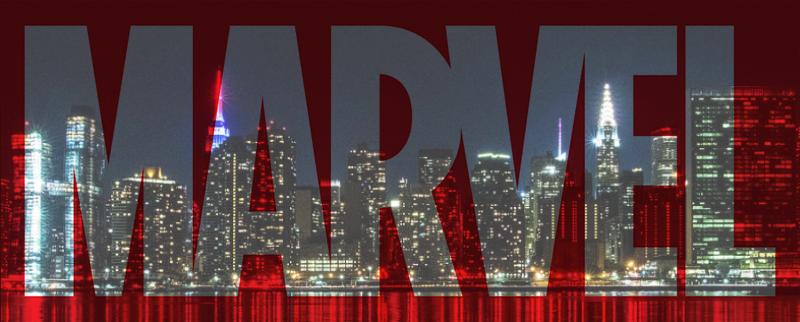Marvel: Political fact or fiction?
In Memoriam of Stan Lee. Stan, thank you for creating the Marvel Universe. It has brought me so much joy over the years. You will be missed.
November 13, 2018
When someone thinks of superheroes, one of two things generally comes to mind: Marvel or DC. And while some people believe that comic books are purely fiction, this is not always the case. In recent years, more and more of the content that we consume is of a political nature, openly or hidden. Although DC has done a good job in having characters that the audience can recognize, Marvel has ultimately done the better job of integrating political issues in both their characters actions and the various platforms where they are portrayed.
In the 70+ years that Marvel has been producing content, there has been a vast range of topics represented, from those with underlying political messages, to those which are just made to entertain. Out of the themes that lie beneath the surface, amazing Marvel content is made, some of which can actually affect the time that we live in. The most obvious example is, of course, Black Panther, which came out this year and has already changed people’s opinion of entertainment.
BLACK PANTHER: POLITICAL MOVEMENT OR JUST A SUPERHERO?
Black Panther told the tale of a high tech East African nation, Wakanda, that is invisible to the outside world. One of the most crucial parts of the film is the group of elite warrior women called the Dora Milaje. In Black Panther (Volume 3, Issue #1), the warriors’ name means “the Adored Ones.” Women who are selected to be a part of the Dora Milaje come from every tribe in Wakanda and are charged with protecting not only the royal family, but the secret nation as well. The Dora Milaje are not the only badass women who reside in Wakanda. Alongside Okoye, the general of the Adored Ones, there is Queen Mother Ramonda, the former monarch of Wakanda, and Shuri, the princess of Wakanda who is also in charge of the scientific and technological advancements of Wakanda.
When speaking to comicbook.com, Chadwick Boseman, who portrays the titular character, said that the movie is not only about a comic book, but about how African Americans look at Africans and vice versa. He explained how important it is to look at all parts of one’s identity and that he feels that Black Panther does a really good job of expressing this.
One of the most powerful moments in the movie is after the first set of credits have rolled: King T’Challa is standing in front of the United Nations, saying that for the first time, Wakanda plans to come out of the shadows and help other countries with their technology and knowledge. When one representative asks how a third world country of farmers can possibly aid the rest of the world, the Wakandans look back at him with pride in their eyes for the future of their nation.
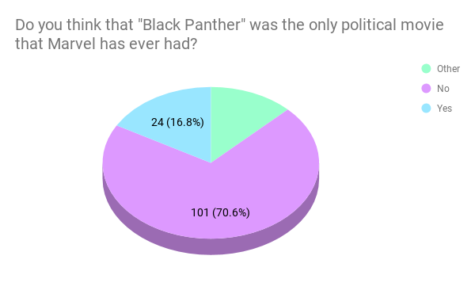
While this was the Marvel movie with the most obvious political message, about 17% of the iSchool populous (including teachers) thought this was the only political Marvel movie. Not everyone believes that Black Panther is a political movie at all.
Junior Carmen Simons pointed out that it is more of a representative movie: “it is one of the first comic book movies to have a mostly black cast,” he said, while also pointing out that it is saying something about our political landscape that the idea of representation has become a political notion.
THE STAR SPANGLED MAN WITH A PLAN… TO DISPLAY OUR POLITICS
Boseman made his Marvel debut in Captain America: Civil War. The title of the third movie in the Captain America saga is a part of American politics all by itself: the Civil War between the South and the North. In this version, the two feuding sides aren’t the Confederacy and the Union; they’re Team Iron Man and Team Captain America. The issue on the table, as it were, is the Superhuman Registration Act, or SRA. It’s a piece of literature that according to Bustle, compares to things like Hitler’s registration of Jews or President Trump’s anti-Muslim rhetoric. Iron Man feels that it’s about time that the Avengers were put in check and take responsibility for their actions while restricting the team’s freedom to go where they feel needed. On the other hand, Captain America is more concerned with keeping his best friend out of police custody for a crime he didn’t commit and making sure that the team can continue to help.
This isn’t the first movie in the Captain America film trilogy with a political message. In Captain America: The First Avenger, Cap is used as a propaganda tool, much like the publication of the first Captain America comic book iteration. In Captain America: The Winter Soldier, the man out of time uncovered two secret plots: HYDRA, the evil organization that first appeared in the 1940’s, had taken over SHIELD in order to kill millions of good people that had interfered with HYDRA in the past. In order to do so, they saved and brainwashed Steve Rogers’ childhood best friend, Bucky Barnes. Steve thought that Bucky had died falling off a train, so the pretty consistent theme between the second and third movies is protecting the only person he still has from his pre-Captain America life.
IS THIS THE REAL LIFE? IS THIS JUST COMIC BOOKS?
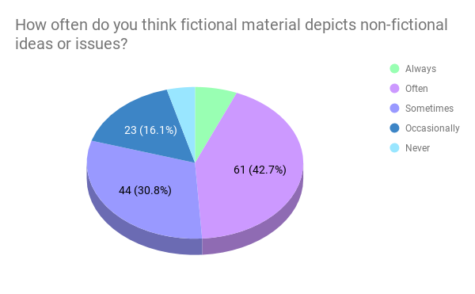
When asked how often they thought fictional content depicted non-fictional ideas or issues, only about 11% of survey respondents went for the two extremes (always and never), which is interesting considering how often politics have impacted the content of varying comic books. Most of them, interestingly enough, were Captain America comics.
As previously mentioned, Steve Rogers was first introduced as a propaganda tool during World War II to get children to ask their parents to buy war bonds. After the war, superheroes mostly disappeared for a while, which, according to HuffPost, was because returning soldiers did not want to read about people with powers that could make the bad things go away.
By the time that JFK was elected, however, even more superheroes had emerged; in fact, a few months after his assassination, Marvel brought back Captain America. Not a lot of other presidents got a lot of Marvel love. Nixon was actually revealed to be at the center of a conspiracy plot in a 1974 storyline. More recent Presidents have gotten much more positive attention. George W. Bush was portrayed as a thoughtful and fair leader during the comic book rendition of the Civil War saga, which instead of restricting actions, was about whether or not superheroes were entitled to secret identities.
SPIDER-MAN: HE’S JUST LIKE YOU. AND YOU. AND OBAMA.
Two of the most prevalent examples of political events and ideas both show up in one of the most well-known heroes in the Marvel Universe: Spider-Man. The writers of this comic book character have pushed the envelope time and time again. In fact, they once tackled an event that changed the future of our whole country: 9/11. Writer J. Michael Straczynski wrote The Amazing Spider-Man (Volume 2, Issue #36) to demonstrate the aftermath of the devastating attack on The World Trade Center. It bravely depicted the resulting chaos of the Twin Towers collapse, while also showing heroes and villains putting aside their differences to help rebuild.

Part of the reason that so many people like Spider-Man is that he’s not just Spidey: he’s also a person living in the world with a secret that could harm everyone and everything he’s ever cared about. He’s easy to relate to for almost everyone, including President Obama.
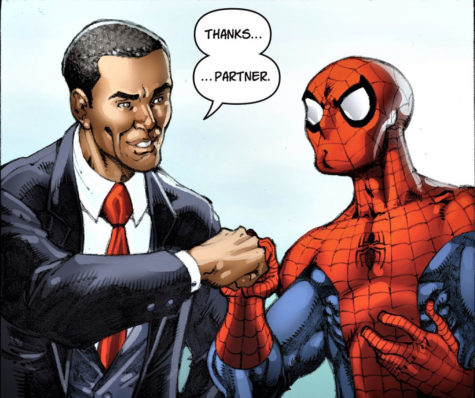
In the same HuffPost article, the author cited an interview that Entertainment Weekly conducted in 2008. In this interview, Obama said, “I was always into the Spider-Man/Batman model… they have some inner turmoil. They get knocked around a little bit.” Fanboys and fangirls all went crazy, and Marvel did too. Jumping at the chance to get Obama to be a character in their comics, they added what’s called “a bonus backup feature” to The Amazing Spider-Man (Volume 1, Issue #583). The story followed Peter Parker covering the inauguration of the President. During the swearing in, Peter’s Spidey sense alerts him to a plot to put a supervillain in power. Spider-Man returns to help the President-Elect.
Being relatable to everyone is definitely one of Spidey’s powers, but that is for various reasons. Spider-Man is relatable because of the vast number of versions of the character that can be found throughout the “Spider-Verse.” There are many different universes out there in Marvel lore and each one has a different Spider-person. Earth-616 is the original Marvel Universe, home to Spider-Man aka Peter Parker. Earth-1610’s Spider-Man is Miles Morales, who took over when his universe’s Peter Parker died. He is actually going to be the main character in the upcoming animated movie Spider-Man: Into the Spider-Verse, which will further explain the Spider-Verse and will show many versions of Spider-People.
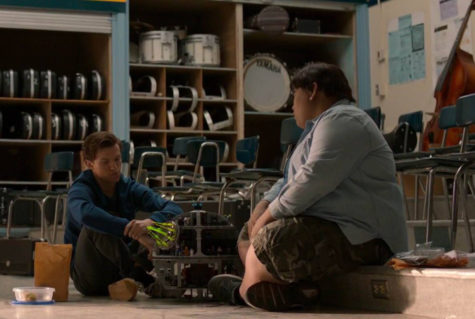
The other reason that Spider-Man is such a relatable character is that he’s really just Peter Parker, high schooler and avid science geek. In the past iterations of Spider-Man’s portrayal, the leading roles went to people who played high schoolers or recent high school graduates but didn’t look like it. That’s why Spider-Man’s creator, Stan Lee, has gone on record as saying that, “it’s as if we created a living being to be Spider-Man, and it turned out to be Tom [Holland].” The most recent actor to portray everyone’s favorite web-slinger is the youngest actor in the MCU to have their own movie. In fact, the most recent Spider-Man movie Spider-Man: Homecoming, has the most real-life teenage problems than any of the past iterations.
GIRLS JUST WANNA HAVE FUN…. AND FIGHT CRIME
One of the most important parts of recent Marvel content is how many different female characters are continually being introduced. Lenny Nuciforo said that, “In the past 5 years Marvel has made an attempt to seem much more progressive. In a world no longer run by mainly men, Marvel realized it needed to adapt and not only have white male superheroes.”
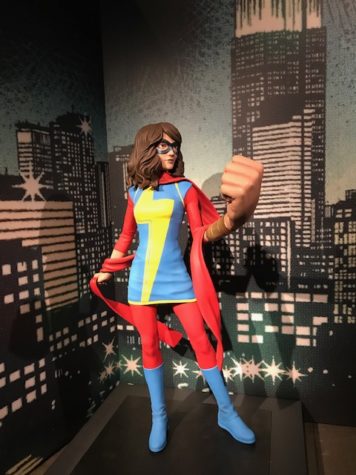
One of the most important characters for diversification is Kamala Khan, a Pakistani-American fangirl. She dreamed of being able to meet her hero, Captain Marvel, and fight alongside her and the rest of the Avengers. One day, instead of writing fanfiction about it, she woke up with the ability to shapeshift into her role model. Since then, she’s been discovering her powers and fighting crime in New Jersey as Ms. Marvel. As Nuciforo also pointed out, “Kamala Khan is a Muslim female and she now has her own headlining comic, something that would not have happened years ago.” She’s not the only female character who has gotten her day in the sun recently.
Gwen Stacy, who in the original cannon, was just Spider-Man’s love interest, has had a new purpose recently: Spider-Gwen (yet another version of Spider-Man, from Earth-35). Another Gwen to make a recent appearance is Gwenpool. Gwenpool has a very interesting story, actually. She comes from a universe a lot like ours, where superheroes are fictional people. Somehow she ends up in that main Marvel Universe.
You may think that superheroes and politics couldn’t possibly be more different. That’s just not true. The content that Marvel creates, which appears to be for entertainment only, is both affected by and effects the world around it. Sometimes this is on purpose, like Captain America’s creation during World War II, or it’s coincidental, like the enormous impact that Black Panther has had on society. Sometimes the stories are familiar – Peter Parker struggling through high school. Or they are completely new – a country that is hidden in plain sight with new technology and medical advancements that are unknown to the world. Over the past 70 years, Marvel has been producing content with the message of doing the right thing and standing up for the little guy. The more that people look at Marvel content seriously, the bigger chance there is for it to change the world.
